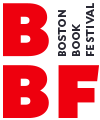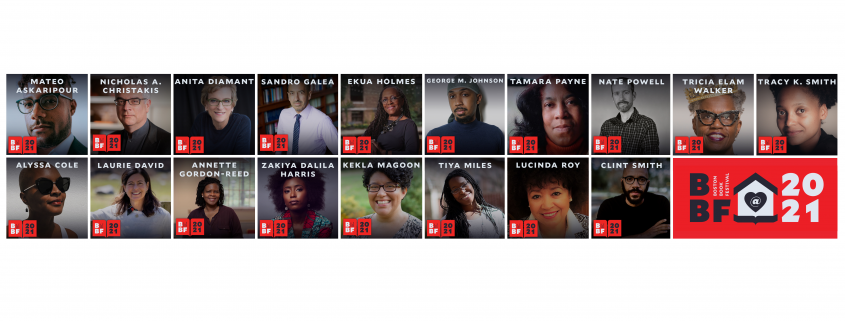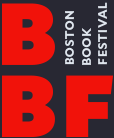2021 Boston Book Festival Headliners: Finding Meaning and Connection through Words and Images
How does a writer respond to events as heavy and impacting as those of these past two years? A global pandemic and the disruption of health, business, and societal connections as we knew them, as well as grassroots movements fighting for the end of systemic racism, a political race with the future of our nation at stake, all against the backdrop of an impending climate crisis.
Everyone lived it. But writers and artists also have the added task of making sense of the world around them, creating meaning from chaos, and finding the humanity, connection, and truth at the core of our shared existence.
That’s what our 2021 Boston Book Festival headliners are seeking to do in their work: make meaning of recent events, or look at history through the lens of new ideas, insights, or identities, or interrogate big themes through fiction, satire, or genre, or simply find the human connection between all of us.
Here are some of the common themes found in our headliners’ work, and how they are fulfilling the Boston Book Festival’s mission by using “the power of words to stimulate, agitate, unite, delight, and inspire.”
Analyzing the Societal Impact of COVID
The Boston Book Festival kick-off keynote session will feature Nicholas A. Christakis, whose book Apollo’s Arrow: The Profound and Enduring Impact of Coronavirus on the Way We Live not only details the COVID-19 pandemic, but seeks to understand its impact on human society. A sociologist and physician whose research focuses on both the social and biological ways people form connections, Christakis asks what it means to live during a pandemic—something few of us have done across history.
Joining Christakis will be Sandro Galea, whose new book The Contagion Next Time looks at how to combat new epidemics, and how it will involve a commitment to—and perhaps a reimagining of—public health that starts with addressing systemic poverty in order to create a more equitable, just, and healthy society.
The Past Informs the Present
The theme of using history to inform our current time continues with headliners who seek to address the racial unrest in our country and examine how its roots in the past continue to branch into the present.
Pulitzer Prize winner Annette Gordon-Reed’s book On Juneteenth details the events leading up June 19, 1865, the date that marks the end of legalized slavery in America, a history that informed the long-awaited creation of Juneteenth as a national holiday this past year. The long shadow of the Civil War is also the topic of Clint Smith’s How the Word Is Passed: A Reckoning with the History of Slavery Across America (longlisted for the 2021 National Book Award), which examines the sites where monuments and landmarks keep slavery alive, and the stories they tell—or don’t tell. Kekla Magoon looks to history to inform the present moment as well in Revolution in Our Time: The Black Panther Party’s Promise to the People (longlisted for the 2021 National Book Award for young people’s literature), a history of the Black Panther Party and Black community activism, tracing a line to the Black Lives Matter movement today. The Pulitzer Prize and National Book Award–winning biography The Dead Are Arising: The Life of Malcolm X, completed by Tamara Payne after the death of her journalist father Les Payne, seeks to put Malcolm X within the context of history: his upbringing, his family’s beliefs, and the systemic racism that still continues. Former Poet Laureate of the U.S. Tracy K. Smith also explores the impact of history in her new collection Such Color: New and Selected Poems, asking questions of America’s history of racism and pushing back against the shadows of the past.
Family, Community, and Connection
Our headliners are also looking to the past to inform their present, but on a much more micro scale, investigating family history—whether their own or someone else’s—and the community around them to make sense of their personal history, identity, and connection.
George M. Johnson’s new memoir We Are Not Broken seeks to tell their own story of Black boyhood, growing up with three brothers and the grandmother that raised them, and to use that story to demonstrate the connections of family and how they inform the adults we become. In All That She Carried: The Journey of Ashley’s Sack, a Black Family Keepsake (longlisted for the 2021 National Book Award), Tiya Miles also seeks to uncover family connections—literally—as she researches a mother and daughter parted in the slave trade in 1852, and the objects that linked them and their descents. Author Tricia Elam Walker and artist Ekua Holmes looked to the past—their childhood in Roxbury—to create the picture book Dream Street, about the everyday people that live in a community and the importance of the connections between them.
Action Today for a Better Future
Our headliners also look at the events and culture around us and anticipate the future—and ask how we should respond.
In his collection of graphic essays Save It for Later: Promises, Parenthood, and the Urgency of Protest, Nate Powell interrogates the idea of what it means to be a parent in our current age of protest and unrest and in what ways he should prepare his children for future activism. Anita Diamant investigates the state of people who menstruate worldwide in Period. End of Sentence. A New Chapter in the Fight for Menstrual Justice and uses stories, anecdotes, and historical fact to encourage normalization of the conversation and ongoing action against menstrual injustice. In Imagine It!: A Handbook for a Happier Planet, Laurie David provides an actionable guidebook for those wanting to reduce their footprint and adopt more sustainable living habits to help combat the increasing threat of climate change.
Race in the (Fictional) Workplace
Unlike historians or reporters, fiction writers have the freedom to use crafted characters and literary tools like metaphor, satire, and analogy to explore timely truths—and two of our fiction headliners are doing just that.
The novel Black Buck by Mateo Askaripour takes a satirical look at workplace culture in America through a main character who is a mysterious company’s only Black salesman, and his witty commentary on the inherent racism of startup culture. Zakiya Dalila Harris’s novel The Other Black Girl follows the only Black editorial assistant at a prestigious white publishing house—and her reaction to the second Black employee that arrives—and provides a commentary on the lack of Black representation in publishing through the guise of a thriller.
Leveraging Genre Fiction to Imagine and Subvert
Authors have long used genre to explore questions of race, justice, equality, identity, and other topics that mainstream or literary fiction doesn’t give the latitude to explore. Two of our headliners are using genre as their medium through which to explore the world around us.
Alyssa Cole’s romance novel How to Find a Princess is rife with the elements of a good rom-com—a secret past, a fake marriage, a high-seas journey—yet those tropes are the vehicle for a queer retelling of the story of Anastasia as well as the inclusion of neurodivergent characters. In the speculative fiction novel The Freedom Race, Lucinda Roy imagines what an America that has reinstituted slavery after a second Civil War would look like and how emancipation can come by competing against others in a race to freedom.
Join the BBF Headliners October 16-23
So how does a writer respond to the world around them, and create art not just from the events and unrest of the current moment, but from the connections between them and others, and from their own understanding of themselves and their identity? Find out at the Boston Book Festival, held virtually on October 16-23. Look for our headliner session list to be released soon.





